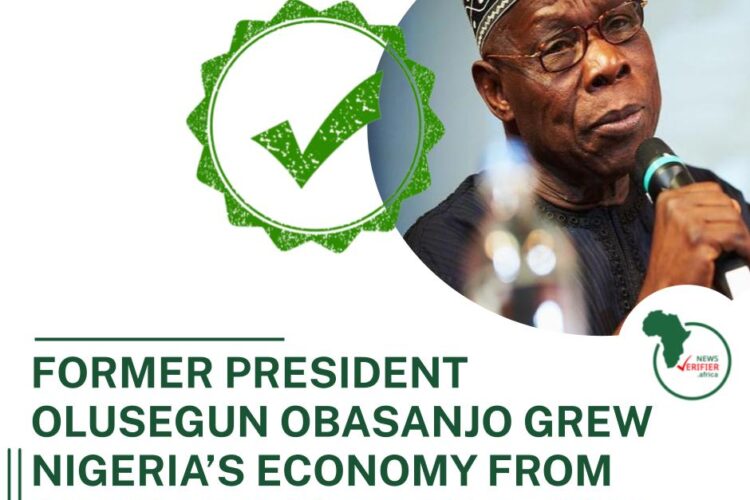Zainab Sanni
Prominent Nigerian TV Presenter, Oseni Rufai claims that former president Olusegun Onasanjo grew Nigeria’s economy from 0.58 percent in 1999 to 5 percent in 2000.
Rufai had made the claim in a post where he shared his opinion on what he described as the woeful performance of the country’s current administration, led by President Bola Ahmed Tinubu, after one-year in office.
The TV Presenter who is a known critic of the presidency has over 984,000 followers on X(formerly Twitter) where he posted the claim. At this time of this report, the claim had garnered over 73,000 views and been reposted over 1,200 times.
Economic growth is not only a development indicator, it is also used to measure the performance of a country’s leader. And given the importance of Nigeria’s economic growth and public concerns about worsening economic indices in the past one year of the President Bola Tinubu’s administration, it is pertinent to verify if the Olusegun Obasanjo administration was able to grow the economy from less than 1% to 5%, within a year.
VERIFICATION
The World Bank explains that growth in a country’s economy is measured by the Gross Domestic Product, GDP. The World Economic Forum (WEF) in a 2022 article, “GDP: How do you measure a country’s true worth” agrees with this position. WEF goes further to describe GDP as the total value of everything that a country produces
The GDP of countries, including Nigeria, is a publicly available data on national and international data centres. For Nigeria, this includes several platforms but notably the National Bureau of Statistics, World Bank and IMF.
N-VA relied on these platforms to confirm Nigeria’s GDP for the year 1999 and 2000.

According to the World Bank Data, Nigeria’s GDP growth rate for 1999 stood at 0.6 percent and went up to 5 percent in 2000.

The International Monetary Fund’s (IMF) tells a different story with its GDP data for Nigeria, it was pegged at 0.5 percent in 1999 and surged to 5.5 percent in 2000, as seen in the chat above.

The National Bureau of Statistics (NBS) reported that Nigeria had 0.58 percent GDP in 1999 under Obasanjo, a year later, it increased to 5.01 percent.
Although there is a slight difference in the GDP figures between 1999 and 2000 from the World Bank, IMF and NBS, the range still puts Nigeria’s GDP in 1999 at less than one percent and five percent for the following year.
CONCLUSION
Data from two international and one national reputable sources on Nigeria’s GDP in any given year provides sufficient evidence that the claim is TRUE.



